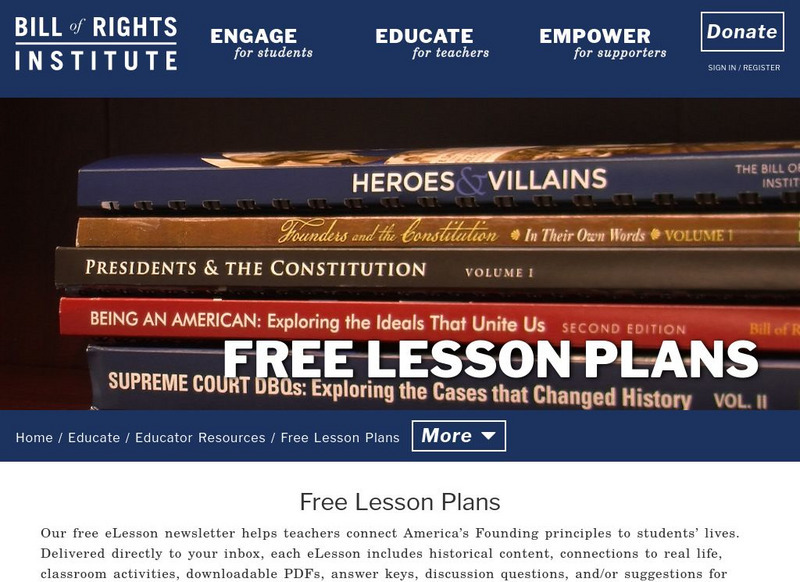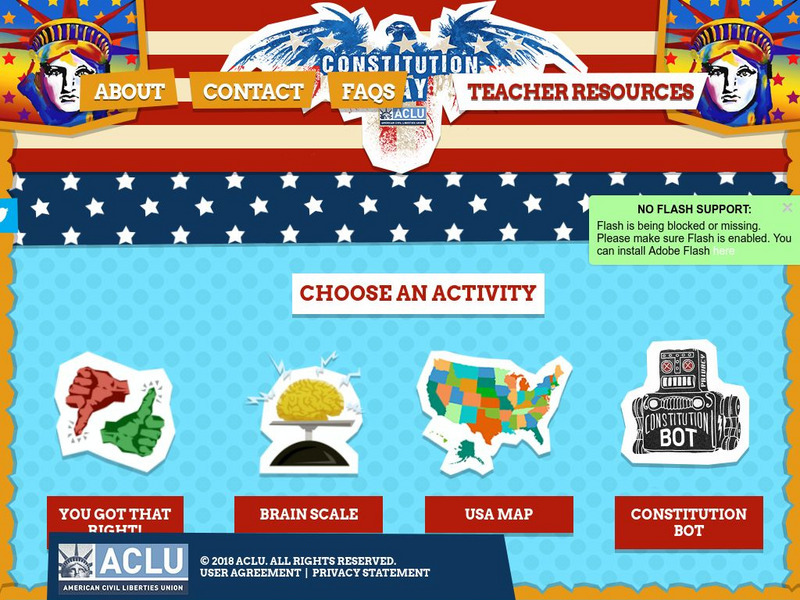Bill of Rights Institute
Bill of Rights Institute: Property Rights and the Supreme Court
A question over a piece of property owned by one, yet deemed protected by the EPA prompted a court case in search of due process and protection of property rights. Find out more about the case and the process through this lesson plan.
Bill of Rights Institute
Bill of Rights Institute: Occupy Protests and the Bill of Rights
A lesson plan and extension activities focused on the Occupy Protests which began in 2011. Young scholars will explore the goal of the protests in relationship to the Bill of Rights.
Bill of Rights Institute
The Bill of Rights Institute: Free Lesson Plans
Free lesson plans concerning the Bill of Rights and the freedoms guaranteed by the Constitution. Included are lessons on important news stories occurring today, as well as lessons on famous Americans and how they executed their rights.
Bill of Rights Institute
Bill of Rights Institute: Justice Thomas on National Identity
An examination of a speech Justice Clarence Thomas delivered in 2009 highlighting his thoughts on the Bill of Rights as well has his views on the importance of American civic responsibility.
Other
Fac: Curfews, Loitering, and Freedom of Association
This detailed article offers a well-documented overview of this constitutional freedom, as well as an FAQ section and additional cases and resources focused specifically on this aspect of the First Amendment. (Published Sept. 16, 2002 /...
Other
Landmark Cases: Miranda v. Arizona (1966)
Lesson plans, activities, and information all about this key Supreme Court decision that protected the rights of the accused. These became known as the "Miranda Warnings." Included is a background summary, excerpts and the complete text...
iCivics
I Civics: The Constitution: Rules for Running a Country
Handy introduction to the Constitution of the United States, which has been our government's rulebook since 1789.
National Constitution Center
National Constitution Center: Amendment X: Rights Reserved for States or People
Provides text to the Tenth Amendment with further interpretation about rights reserved for the states or the people.
Annenberg Foundation
Annenberg Classroom: First Amendment
Annenberg Classroom summary and text of the 1st Amendment to the Constitution. Links to relevant news articles, video, and timeline.
The Dirksen Congressional Center
Dirksen Congressional Center:congress for Kids: Introduction to the Constitution
Explore the history of the United States Constitution: information about the writing the Constitution, the Great Compromise, the Constitution's signers, the Bill of Rights, the Amendments to the Constitution, federal powers, checks and...
Annenberg Foundation
Annenberg Classroom: Our Constitution: Second Amendment (1791)
Text and summary of the 2nd Amendment to the U.S. Constitution. Site includes a timeline as well as a link to a second timeline that has hyperlinks to additional information.
US National Archives
National Archives: Congress Creates the Bill of Rights
A set of activities that link to a mobile app called "Congress Creates the Bill of Rights." The materials used in the app can also be downloaded in PDF format. There is also a free ebook in epub format that is incorporated into the...
US National Archives
Nara: Charters of Freedom: Constitution of the United States
Comprehensive overview of the U.S. Constitution. Places the Constitution in context with two other founding charters of American democracy and government, the Declaration of Independence and the Bill of Rights. Includes access to digital...
Annenberg Foundation
Annenberg Classroom: That's Your Right
An engaging online card game where students learn about the Bill of Rights by matching situations with the correct right. There are three levels of difficulty. Includes a short video for each of the first ten Amendments to the...
Other
Bill of Rights Institute: College Bill of Rights
Colleges and universities often carry stricter policies than the Bill of Rights to protect their students, even with their students being legal adults. Explore whether this is constitutional or not with the aid of this lesson plan.
The Newberry Library
Newberry Library: Anti Statism in u.s. History
Newberry Library digital collections presents a lesson using primary sources from which students explore the concept of "anti-state" sentiment and examine the reasons writers and politicians protest the authority of the federal...
Boston College
Boston College: Schenck v. United States
Read the decision of this landmark Supreme Court decision involving the 1917 Espionage Act Schenck v. United States (1919).
Boston College
Boston College: Dennis v. United States (1951)
Full syllabus and decision from the Dennis v. United States Supreme Court case.
Boston College
Boston College: Bigelow v. Virginia
Complete syllabus and decision on the Supreme Court case Bigelow v. Virginia (1975).
PBS
Pbs Learning Media: Writing in u.s. History: The Bill of Rights
Explore why the Bill of Rights was added to the Constitution and its enduring impact on defining our rights. In this interactive lesson from WGBH, students develop a written argument in response to the question "How does the Bill of...
iCivics
I Civics: The Federalist Debate
The ratification debate between the Federalists and Anti-Federalists gives us insight into the ideas behind both sides and a better understanding of how our government developed in its early years.
Other
American Civil Liberties Union: Constitution Day Activities
Six activities teach students about the U.S. Constitution. Learn about checks and balances, the Bill of Rights, some of the history of the document, and how each of the states became a state. The site also provides teacher resources,...
iCivics
I Civics: You've Got Rights!
Students learn about the rights guaranteed by the Bill of Rights and other important constitutional amendments.
Library of Congress
Loc: Creating the United States: Creating the Bill of Rights
As part of this 'Creating the United States' interactive resource, this section deals with creating The Bill of Rights. Connect particular phrases and ideas set down in The Bill of Rights with texts that preceded it.















